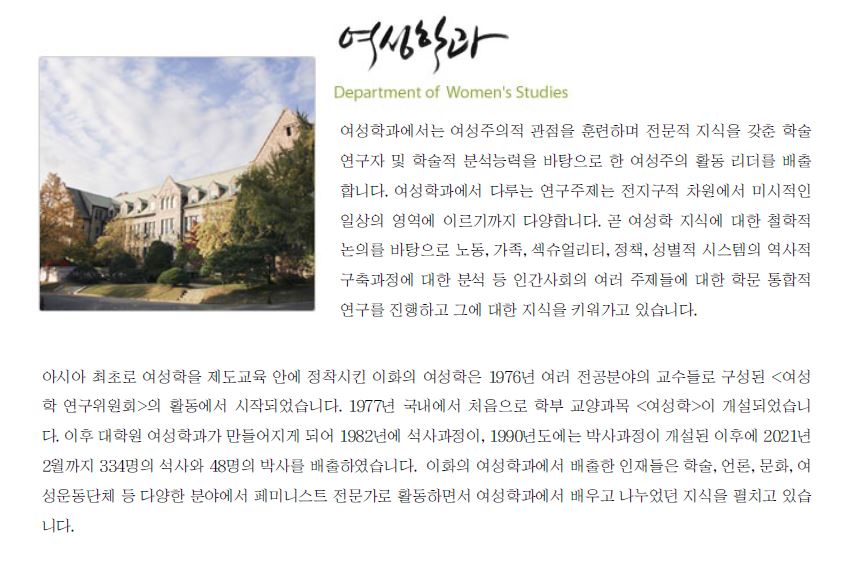학과소개
학과 소개

여성학과 Department of Women's Studies
여성학과에서는 여성주의적 관점을 훈련하며 전문적 지식을 갖춘 학술 연구자 및 학술적 분석능력을 바탕으로 한 여성주의 활동 리더를 배출 합니다. 여성학과에서 다루는 연구주제는 전지구적 차원에서 미시적인 일상의 영역에 이르기까지 다양합니다. 곧 여성학 지식에 대한 철학적 논의를 바탕으로 노동, 가족, 섹슈얼리티, 정책, 성별적 시스템의 역사적 구축과정에 대한 분석 등 인간사회의 여러 주제들에 대한 학문 통합적 연구를 진행하고 그에 대한 지식을 키워가고 있습니다.
아시아 최초로 여성학을 제도교육 안에 정착시킨 이화의 여성학은 1976년 여러 전공분야의 교수들로 구성된 <여성 학 연구위원회>의 활동에서 시작되었습니다. 1977년 국내에서 처음으로 학부 교양과목 <여성>이 개설되었습니 다. 이후 대학원 여성학과가 만들어지게 되어 1982년에 석사과정이, 1990년도에는 박사과정이 개설된 이후에 2021년 2월까지 334명의 석사와 48명의 박사를 배출하였습니다. 이화의 여성학과에서 배출한 인재들은 학술, 언론, 문화, 여 성운동단체 등 다양한 분야에서 페미니스트 전문가로 활동하면서 여성학과에서 배우고 나누었던 지식을 펼치고 있습 니다.
1975년 유엔이 정한 ‘세계 여성의 해’는 ‘여성의 인간화’와 ‘여성 지도자의 양성’이라는 이화가 지향하는 이념을 구체화할 수 있는 장을 만드는 계기가 되었습니다. 가부장적 신분사회에서 여성은 힘없는 존재일 수 밖에 없었지만, 다양한 전공분야에서의 이화의 교수들은 ‘힘없는 자의 힘’을 인식하고 있었습니다. 독립 학과로서의 여성학과가 태어나기 이전 이화의 교수들은 여성을 주제로 다양한 연구모임과 학술대회를 통해 학문으로서의 여성학의 탄생에 중요한 기여를 하였습니다. 1975년 이남덕 교수는 “전통사회와 여성의 힘”이라는 논문에서 우리의 역사 속에서 “가장 약한 자는 가장 강한 자”였다는 역설의 논리를 전개합니다(장필화, “여성주의 연구: 미래를 위한 지식생산과 도전” 참조).
가부장적 유교문화가 아직도 뿌리 깊은 우리 사회에서 여성은 아직 우리도 알 수 없는 많은 분야에서 주변화 되고 소외되어 있습니다. 그러한 ‘약한 자의 힘’에서 우리 사회를 살려낼 수 있는 길을 모색하고자 하는 여성학 또한 학문 분야에서 주변화 되어 온 것 또한 사실입니다. 그러나 ‘주변인의 눈이 가장 덜 오염된 눈’이라는 사실을 인정한다면 여성은 가부장제 사회에서 가장 덜 왜곡된 시선으로 사물을 볼 수 있는 잠재력을 가진 집단이라 할 수 있을 것입니다. 이러한 점에서 여성과 소수자 등 주변인의 관점을 강조하는 여성학이 우리 사회의 가부장적 지식체계와 문화, 제도를 수정할 수 있는 역할을 할 수 있으리라는 기대를 해 봅니다. 여성학과가 배출한 인력들은 학계와 언론, 문화, 시민사회, 여성운동 등 다양한 분야에서 이러한 변화를 위한 구체적인 작업을 해 오고 있습니다.
The Department of Women's Studies provides training in developing feminist perspectives to foster professional and knowledgeable academic researchers, and future leaders of feminist campaigns with strong academic analysis skills. The Department explores a range of research topics, ranging from globally relevant concepts to more microscopic, everyday areas. Based on philosophical discussions regarding feminist knowledge, it carries out interdisciplinary research to analyze how labor, family, sexuality, policy, gender systems, and other various topics of human society were established throughout history, enhancing our understanding of them.
Ewha Womans University Department of Women's Studies, the first in Asia to incorporate women's studies into mainstream education, originated from the Women's Studies Research Committee, which was formed in 1976 by professors from varying departments. In 1977, Ewha started to offer Women's Studies as an undergraduate elective subject for the first time in South Korea, leading to the establishment of the Department of Women's Studies. The Department introduced master's programs in 1982 and doctoral programs in 1990. As of February 2021, it has awarded 334 master's degrees and 48 doctoral degrees. Graduates of the Ewha Department of Women's Studies now work as feminism experts in various fields, including academia, journalism, culture, and gender action groups, spreading the knowledge they learned and exchanged at the Department.
International Women's Year, established by the United Nations in 1975, provided the background for Ewha to materialize its vision to "humanize women" and "foster women leaders." Due to the patriarchal and stratified nature of South Korean society, women helplessly found themselves in vulnerable positions, but professors at Ewha from varying departments were aware of the "power of the powerless." Even before the establishment of the Department as an independent department, professors at Ewha had already made significant contributions to the foundation of women's studies as an academic field by forming a range of research groups and academic conferences that explored topics related to women. In her 1975 paper "Traditional Societies and the Power of Women," Professor Lee Namduk presented a contradictory argument that "the most vulnerable was always the strongest" in our history. (See "Feminist Research: Knowledge Production and Challenges for the Future" by Jang Pilhwa)
In South Korean society, which is still strongly underpinned by patriarchal and Confucian values, women remain marginalized in so many unidentified areas. It is also true that women's studies, an academic field that seeks ways to save our society with the "power of the vulnerable," have been marginalized in academia. Nevertheless, if we acknowledge the fact that "the marginalized eye is the least corrupt eye," women can be thought of as a group of people who have the potential to see objects from the least distorted point of view in a patriarchal society. This gives us the hope that women's studies, which puts an emphasis on the perspective of the marginalized, including women and minorities, may help reform the patriarchal knowledge structure, culture, and systems of our society. To bring about such changes, graduates of the Department are taking action in various fields such as academia, journalism, culture, civil society, and feminist movements.
걸어온 길 (History)
연락처 및 주소(Contact Us)
- 주소 : 서울시 서대문구 이화여대길 52 이화여자대학교 이화포스코관 연구동 108호 (우)03760
- 홈페이지 : https://cmsfox.ewha.ac.kr/wstudies/index.do
- 전화번호: (02) 3277-2107
- 이메일 : E600049@ewha.ac.kr
Address: Unit 108, Research Wing, Ewha-POSCO Building, 52, Ewhayeodae-gil, Seodaemun-gu, Seoul, Republic of Korea
Website: https://cmsfox.ewha.ac.kr/wstudies/index.do
Telephone: (02) 3277-2107
Email: E600049@ewha.ac.kr
